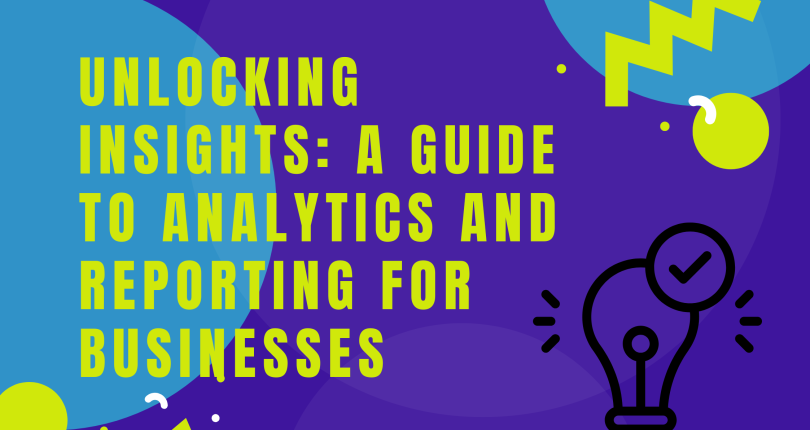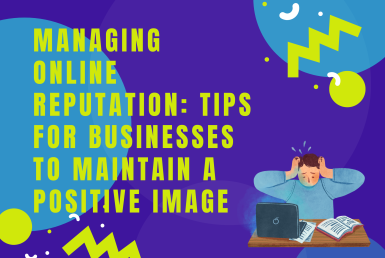Unlocking Insights: A Guide to Analytics and Reporting for Businesses

In the digital age, data has become a valuable asset for small and medium-sized enterprises (SMEs). By harnessing the power of analytics and reporting, SMEs can gain valuable insights into their marketing efforts, customer behaviour, and overall business performance. In this article, we will explore the importance of analytics and reporting for SMEs and provide a comprehensive guide on how to unlock insights and make data-driven decisions to drive growth and success.
Understanding the Value of Analytics and Reporting:
Analytics and reporting provide SMEs with the ability to measure and evaluate the performance of their digital marketing initiatives. By tracking and analysing data, businesses can gain insights into their website traffic, user behaviour, campaign effectiveness, and customer preferences. These insights enable SMEs to make informed decisions, optimise their strategies, and maximise their return on investment (ROI).
Defining Key Performance Indicators (KPIs):
To effectively measure success, SMEs need to define relevant Key Performance Indicators (KPIs). KPIs should align with business goals and objectives and vary based on the nature of the business. Common KPIs include website traffic, conversion rates, customer acquisition costs, average order value, and customer lifetime value. Select KPIs that provide meaningful insights into the specific areas you want to track and improve.
Setting Up Analytics Tools:
To collect and analyse data, SMEs need to set up analytics tools on their websites. Google Analytics is a popular and powerful tool that provides comprehensive insights into website performance. Install the tracking code on your website to start gathering data. Configure goals and conversion tracking to measure specific actions, such as form submissions or product purchases. Familiarise yourself with the various reports and features available in your chosen analytics tool.
Analysing Website Performance:
Website analytics provide valuable information about user behaviour, traffic sources, and engagement metrics. Monitor metrics such as total visits, unique visitors, bounce rate, time on site, and pages per session. Identify patterns and trends to understand which pages are performing well and which ones may need improvement. Analyse traffic sources to determine which channels are driving the most valuable visitors to your website.
Tracking Marketing Campaigns:
Analytics allow SMEs to track the effectiveness of their marketing campaigns. Implement campaign tracking parameters, such as UTM parameters, to measure the performance of different marketing channels and campaigns. Monitor key metrics like click-through rates, conversion rates, and cost per conversion to evaluate the success of your campaigns. Use these insights to optimise your marketing spend and allocate resources to the most effective channels.
Creating Custom Reports:
Custom reports provide a tailored view of your data and allow you to focus on specific metrics that matter to your business. Utilise the reporting features in your analytics tool to create custom dashboards and reports that highlight the KPIs and metrics relevant to your business objectives. Regularly review and share these reports with key stakeholders to keep everyone informed about the performance of your digital marketing efforts.
Applying Insights to Drive Growth:
Once you have gathered and analysed data, it’s essential to translate insights into actionable strategies. Use the insights gained from analytics to identify areas for improvement, optimise website performance, refine marketing campaigns, and enhance the overall customer experience. Continuously monitor data, test new ideas, and iterate based on the results to drive sustainable growth for your SME.
Staying Up-to-Date with Analytics Trends:
The field of analytics is ever-evolving, with new tools, technologies, and trends emerging regularly. Stay informed about the latest advancements in analytics and reporting to leverage the most relevant techniques for your SME. Attend industry conferences, participate in webinars, and follow trusted digital marketing publications to stay up-to-date with best practices and industry insights.
Conclusion:
Analytics and reporting are invaluable assets for SMEs, providing them with the ability to unlock insights and make data-driven decisions. By understanding the value of analytics, setting up the right tools, tracking performance, and applying insights effectively, SMEs can optimise their marketing efforts, improve customer experiences, and drive growth. Embrace analytics as a powerful tool to measure, analyse, and adapt, and watch your SME thrive in the dynamic digital landscape.




